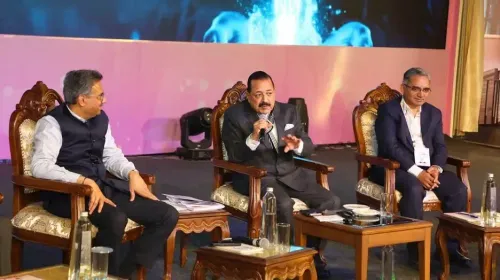Is India's Startup Hiring Really Surging 32%?

Synopsis
Key Takeaways
- 32% year-on-year rise in startup hiring.
- Shift towards sustainable and innovation-led growth.
- Significant increase in new startup registrations by 22%.
- Tier-2 cities now account for 31% of startup job postings.
- Focus on hiring experienced professionals over freshers.
Bengaluru, May 5 (NationPress) The startup landscape in India is witnessing a remarkable surge, with hiring increasing by 32 percent year-on-year, marking a strategic shift towards sustainable and innovation-driven scaling, as highlighted in a report released on Monday.
The findings from jobs platform foundit (previously known as Monster APAC & ME) indicate that India’s white-collar job market is robust, showing an 18 percent year-on-year growth.
The report emphasizes a renewed confidence in the startup job market.
In April 2025, job postings in startups experienced a 32 percent year-on-year increase and a 12 percent rise over the last three months, reflecting a revitalized hiring confidence.
This hiring wave is further bolstered by a 22 percent increase in new startup registrations over the previous year.
“We are observing a significant transformation in how startups in India are scaling,” stated V. Suresh, CEO of foundit.
“Growth is expanding beyond major metropolitan centers; we are seeing a vibrant growth in Tier-2 cities, indicating a more equitable and inclusive growth model. Additionally, there is an increasing focus on hiring experienced professionals, underscoring a strategic emphasis on long-term sustainability,” he further added.
IT services lead the startup hiring scene, constituting 32 percent of all startup job postings, up from 23 percent last year.
The healthcare sector has also shown growth, rising from 6 percent to 9 percent, indicating a heightened focus on deep tech and health-centric solutions.
Conversely, sectors such as media and entertainment, and edtech, focused on consumer demands, have observed steady declines.
Additionally, Tier-2 cities are rapidly emerging as significant startup hubs, with their job share skyrocketing from 9 percent in April 2024 to 31 percent in April 2025.
This tripling signifies a decisive change in the geography of India’s startups, led by cities like Coimbatore, Jaipur, Indore, Lucknow, and Bhubaneswar, according to the report.
Meanwhile, Bengaluru, Delhi/NCR, and Mumbai saw significant declines in their startup job shares, while Chennai and Hyderabad remained stable, highlighting a clear trend towards more distributed, nationwide startup growth.
Startups are also increasingly valuing experience, evidenced by a drop in hiring freshers (0-3 years of experience) from 53 percent to 41 percent year-on-year as of April 2025.
This trend reflects a rising demand for specialized skills across various levels, with roles for mid-career professionals (4-6 years and 7-10 years of experience) increasing to 28 percent and 15 percent, respectively.
“These movements indicate a more thoughtful, future-oriented strategy that prioritizes sustainable growth and long-lasting impact over rapid, short-term gains,” Suresh remarked.










